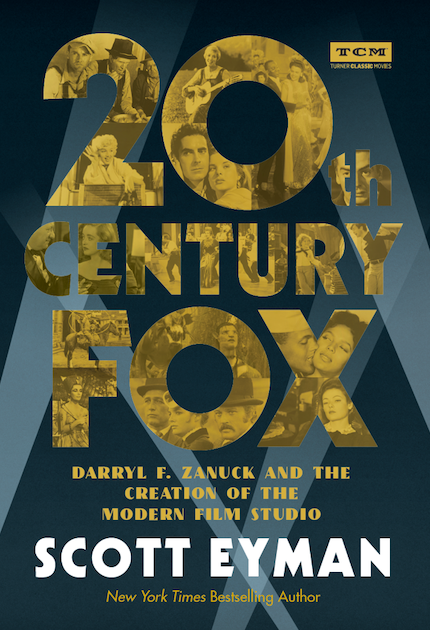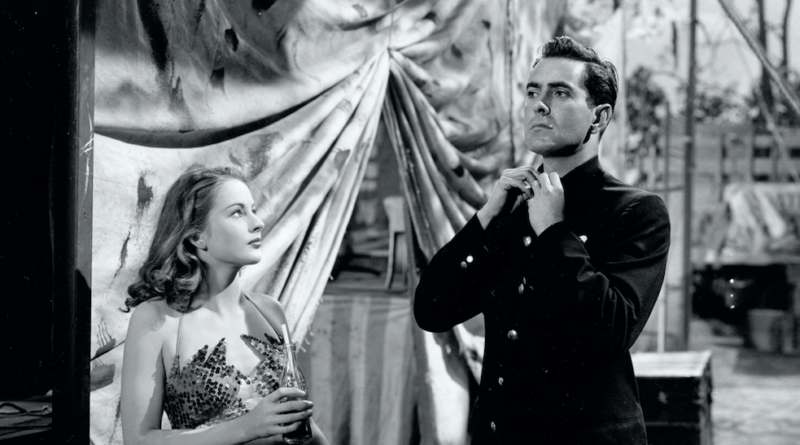INTERVIEW: New TCM book explores ’20th Century-Fox’ and influence of Darryl F. Zanuck
Photo: Coleen Gray and Tyrone Power star in Nightmare Alley, one of the pictures produced by Darryl F. Zanuck. Photo courtesy of TCM / Provided with permission.
Hollywood has offered so many stories for so many years, from a Kansas girl stuck in the world of Oz to a great white shark that terrorizes three men on a boat. The narratives of Tinseltown have shaped culture and society for generations, but sometimes the most interesting stories are the ones about the Hollywood industry itself. Tales of demanding studio executives, difficult directors and aging actors who remember their fond days in the spotlight are the fables that give this movie-making town its reputation as a make-it-or-break-it factory.
Scott Eyman lives and breathes stories of old Hollywood. He has published books about Cary Grant, Henry Fonda, James Stewart, John Wayne, Louis B. Mayer and John Ford, a who’s who of men who dominated 20th-century filmmaking. Now the author is back with another biography, this time of a studio and the man in the highest office: 20th Century-Fox: Darryl F. Zanuck and the Creation of the Modern Film Studio, which has recently been published by TCM through its imprint, Running Press.
“I’d always been interested in Zanuck,” Eyman said in a recent phone interview. “I always loved his pictures from when I was a kid, the early Warner Bros. that he was producing when he was production head at Warners. … They were all very much of their time, and they really reflected what was going on in the world. And when he went over to merge with Fox, took his independent company and merged with Fox in ‘35, and he couldn’t do those kinds of pictures anymore because he didn’t have the talent that he had at Warner Bros. They were still at Warner Bros.”
The story that Eyman details in the book is one of adapt-or-die dominance and reinvention. Zanuck left Warner Bros. and brought a studio into the modern era, and it paid off because Fox is still a major player in the business that is show. Along the way, the producer shepherded along many high-profile careers, including that of Betty Grable, Marilyn Monroe, Shirley Temple, Tyrone Powers, Gene Tierney and Henry Fonda. The hits kept on coming: movies like The Grapes of Wrath, How Green Was My Valley and Gentleman’s Agreement.
“He had to reinvent himself, and he did with very little difficulty,” the author said. “In other words, he wasn’t tied down to a specific kind of filmmaking. He could see where the market was going and adjust accordingly, which was very unusual. … [Other studio heads] weren’t that adept emotionally at adjusting to changing times. Zanuck was, and that interested me because I love the movies he made at Warners, I love the movies he made at Fox. They were just different.”
What also interested Eyman was the dichotomy between who Zanuck was in the studio system and who he was at home. Helping the writer flesh out this legendary figure were many historical resources and interviews, including with Zancuk’s son, the late Richard Zanuck.
“I interviewed Richard Zanuck twice, once extensively, and the relationship between Darryl and his son was strange and kind of strangled and respectful, but not warm,” he said. “Zanuck, on the one hand, he promoted his son and wanted him to succeed. On the other hand, he didn’t want him to succeed too much because he’d be competition for Darryl. [laughs] There’s kind of a Shakespearean tragedy woven into all this show business success.”
Eyman’s alternate title for 20th Century-Fox was He Knew What He Wanted, which speaks to Zanuck’s leadership style. The author reports that the producer’s story meetings were explicit, and he demanded that many scripts be shot as he had outlined them. That said, he let A-list directors have some freedom because he trusted them with the stories he wanted to tell.
“He didn’t try to tell John Ford what to shoot,” he said. “He thought John Ford was the greatest director in the history of motion pictures. Ford would go off and do what Ford did, same thing with [Ernst] Lubitsch, same thing with Preston Sturges, and he lost a lot of money on Preston Sturges. But when a prestige guy came into the lot, Zanuck gave them a lot of leash to roam around. Other directors didn’t have that same latitude. Philip Dunne — a wonderful screenwriter, not so good a director, but a wonderful screenwriter — told me that Zanuck treated Michael Curtiz like a slave on The Egyptian, really abusive. That’s Curtiz. He’s a very fine director with a lot of great films in back of him, but Zancuk wasn’t happy with him.”
There are many acting careers that are inextricably tied to Zanuck’s time with Fox. For example, when he joined the company, Shirley Temple was an established child star, but the producer helped take her to the highest level. He figured out the right formula for a Shirley Temple movie, and then he instituted a process, essentially commodifying her talents for three pictures a year.
“The money just rolled, rolled, rolled in until puberty, which basically ended her career, as it often does with child stars,” Eyman said. “They go, they go, they go, but once they’re not the cute little kid anymore, the public loses interest.”
The author suspects that even without Zanuck’s promotion, Marilyn Monroe would have made a name for herself. Eyman believes the actor’s radiance was front and center, and the movie producer was lucky to have her in the company; however, the same cannot be said for other performers at Fox.
“He really did build them from the ground up,” he said. “In the book, there are two stills of [Betty] Grable, the famous one taken during World War II when she’s in a bathing suit. She’s looking over her shoulder at the camera, and then there’s another shot from about nine years earlier when she’s also at Fox. And she’s unrecognizable. Zanuck figured out her look. Zanuck figured out how to present her because she had limited skills. She was charming. She was cute. She was bubbly. She couldn’t really act, and she could dance a little. … So how do you leverage that into a huge starring career? He figured it out.”
Eyman said that when Zanuck arrived at Fox, there were few bankable stars. He had Temple, yes, but the other known actor was Will Rogers, who tragically died six weeks into the producer’s time with the studio.
“So what do you with that? Well, you’ve got to find a romantic leading man, which he did, Tyrone Power,” Eyman said. “He took care of these people, and he built them up out of nothing. And he found himself a stable of stars, which is essentially the core business of a movie producer in the studio system of that era. You had to have a stable of stars because unless you had a stable of stars, mass production doesn’t really make sense because if you’re renting stars from other companies, it’s going to cost you too much money. So you have to have an in-house stable that you can plug in at a moment’s notice, that you’re paying a more moderate amount of money than you would if you were borrowing someone from MGM, and they want double what they’re paying that person in order to make it worth their while to lend them out.”
To put it simply: “There are a lot of stars though that wouldn’t have existed without Zanuck.”
By John Soltes / Publisher / John@HollywoodSoapbox.com
20th Century-Fox: Darryl F. Zanuck and the Creation of the Modern Film Studio by Scott Eyman is available now from TCM and Running Press. Click here for more information.


